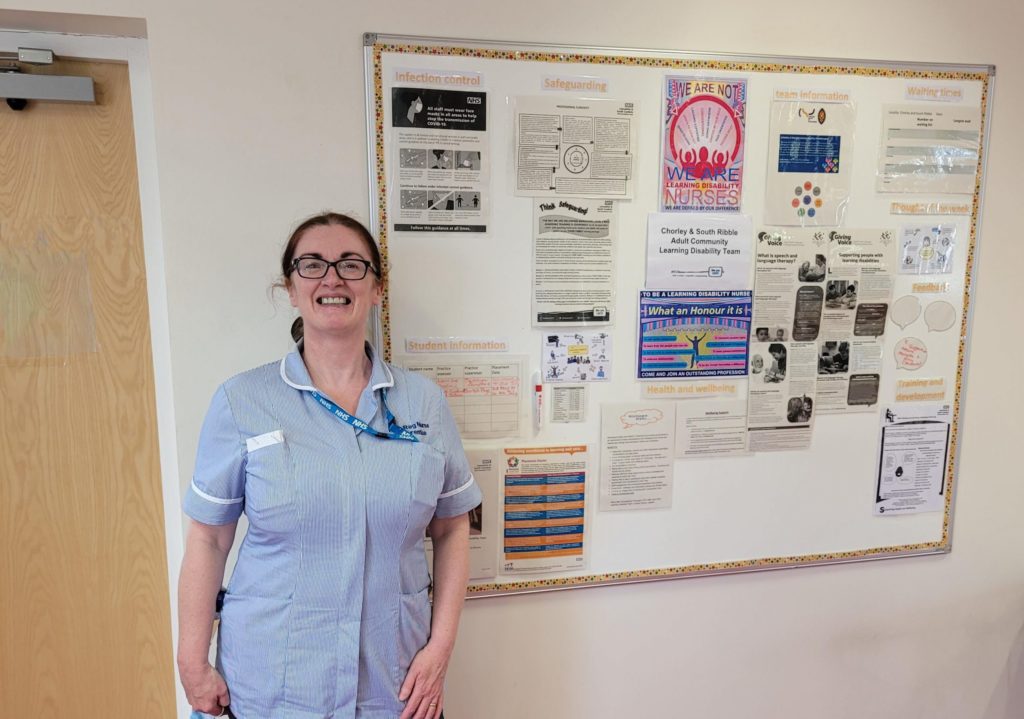The importance of person centred nursing care to improving the lives of people with learning disabilities – Part 1 of 2

In this two-part blog, we explore what person centred nursing care means.
An interview with Michelle McAteer – Registered Nurse, Degree Apprentice, Learning Disabilities and Nursing Associate Ambassador for Health Education England.
Michelle tells us how she practices Person Centred Nursing by putting each person’s specific needs at the heart of their care.
Can you tell us about the trust you work for?
Lancashire and South Cumbria NHS Foundation Trust (LSCft) is a mental health, learning disability and community services provider. It provides health and wellbeing services for around 1.8 million people and employs over 6,300 staff across more than 400 sites, working with various partners.
The trust is a big advocate for nursing associate and degree apprentice courses, offering schemes that allow people to gain a nursing qualification whilst working.
Based in Lancashire, Michelle was able to take advantage of a pilot Nursing Associate scheme run by LSCft to move on from her role as a support worker in a school nursing team.
She’s since joined another pilot scheme with LSCft to become a Registered Learning Disability Nurse via the Registered Nurse Degree Apprentice route.
What’s unique about the community you serve?
It’s vast geographically and has a very diverse range of communities, with affluent pockets and areas that are quite deprived. There’s a range of ethnic communities, plus some rural areas. For me, this means I need to tailor my care to the community I’m in.
At LSCft, we have a range of courses that help us to understand different communities’ barriers to accessing healthcare. For example, we had training on how to deliver care to the Gypsy and Traveller Community and tackle health inequalities. We know that members of the community can often be ‘closed’ and see healthcare workers as outsiders. It can be simple things that allow you to engage, such as the terminology you use. We were taught that when talking to members of that community about mental health, you shouldn’t use the term mental health, but instead, ask: “Are you suffering with your nerves?”
What’s fundamental to providing person centred care for people with learning disabilities?
Making sure people feel involved in their care looks different for people with learning disabilities. It’s vital to have friends and family involved to understand what the patient wants and what’s important to them. We can use tools if the patient has difficulty communicating, we spend time on specific issues and adapt the length of our visits to the patients’ needs.
What’s needed to provide person centred care outside of involvement and communication?
Sharing information about patient’s needs with other health professionals. Currently, each Learning Disability patient has a hospital passport, which is a physical set of notes that they/their carers take to hospital with them. It contains all the information about what is important to that person, allowing the nurses to adapt their care to the patients’ needs. One of our computer systems has a tag for patients with learning disabilities. But hopefully, in the future, hospital passports will be computerised, then if a patient requires emergency care, the information will be readily available to staff.
From being admitted to hospital, the staff should be tying up with the Learning Disabilities Nurse to arrange discharge. Having joined up computer systems would help with this process and make it easier to provide continuity of care.
What does good care look like to you for a patient?
For me, it’s putting the patient at the heart of care, picking up on the subtle things that are important – for example, are they struggling with their mental health and need more care? I like to be very hands-on and spend as much time as possible with the patients. Simple things can make a big difference. For example, I always go and introduce myself to patients at the start of a shift. Then my first interaction with them is a positive one, and it breaks down the nurse/patient barrier. When I was working on an acute mental health inpatient unit, a patient became very distressed during my shift, but she came to find me because I’d introduced myself to her earlier. She said she liked me because I’d spent time with her that morning. We were then able to work through her crisis together.
Are there any mechanisms to hear the feedback from patients about the care they receive?
We use the Friends and Family Test (FFT), which we follow up. We also run surveys that are based on the National Inpatient Survey. Our Patient Experience and Engagement Group collate all the feedback and share it with staff. The group is looking at ways to make it easier to share the information with us. I like to receive feedback because I feel getting feedback makes you grow as a practitioner.
How do education and development equip you to deliver good care?
It gives you the skills to reflect and analyse. I’m very much someone who likes to read up on a procedure, observe it and then evaluate that nurse’s practice. I discuss things that come up with more experienced colleagues and compare LSCft’s policies to other trusts’.
Reflection time is built into my course. I use different models of reflection – for example, Gibbs, Johns and Rolfe et al., to add structure to my evaluation.
What’s your ambition in nursing?
For myself, my ambition is to work up from a Band 2 to a Band 6. You have a formal leadership role at that level but are still hands-on with the patients and deal with more complex cases.
LSCft is very supportive and provides a range of development sessions – including, help to apply for jobs and interview skills. There are also lots of mini skills sessions that I can do to keep on developing as a nurse. Eventually, I’d like to study at Masters level.
For my patients, my ambition is for them to be supported in what they want to do and have the best life they can.
Read Part 2.

